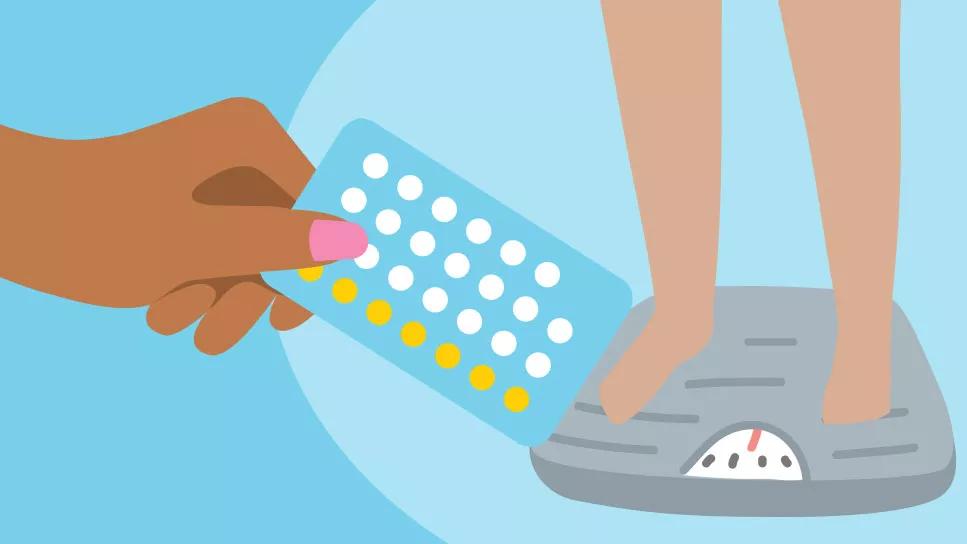Despite popular opinion, scientific research shows that most birth control methods don’t contribute to weight gain

When it comes to birth control medications, you have a lot of options.
Advertisement
Cleveland Clinic is a non-profit academic medical center. Advertising on our site helps support our mission. We do not endorse non-Cleveland Clinic products or services. Policy
Pills. Patches. IUDs. Implants. Injections.
And that’s not even including choices like fertility awareness, condoms, diaphragms and surgical procedures like tubal ligation (aka “getting your tubes tied”).
Choosing what birth control method is best for you is a matter of your preferences, goals and health needs.
And for some people, one part of that equation is understanding the potential side effects of different forms of birth control like, Does birth control make you gain weight?
The answer? According to years and years of research, an almost-resounding nope, says Ob/Gyn Ashley Brant, DO.
“Weight is a touchy subject for so many of us,” Dr. Brant acknowledges. “It’s really hard for some people to lose weight and easy to gain weight without trying to. So, it makes sense that people look for a cause. But in most cases, it’s not your birth control pill.”
So, why is your sister, your best friend, that TikToker you saw yesterday so quick to tell you that birth control causes weight gain? Let’s take a look.
The myth that birth control causes weight gain is a strong one. Lots of people are under the impression that weight gain is almost a given when you take birth control pills or have an IUD implant.
Advertisement
But rigorous scientific research says that’s not the case.
“The very brief answer is that most forms of birth control have not been proven to cause weight gain. And it has been studied pretty extensively,” Dr. Brant confirms.
But there is one outlier. The Depo-Provera® birth control shot has been shown to cause some weight gain in some people.
“The average weight gain for someone who’s been on Depo-Provera for a year is about five pounds,” Dr. Brant shares. “But remember that an average is just that — an average, which means that some people gain more and some people don’t gain weight at all.”
Depo-Provera is a form of birth control that’s given as an injection at your healthcare provider’s office every three months. It contains a large dose of progesterone, which is known to have appetite-stimulating effects. Very large amounts of progesterone (much higher than used in the birth control methods) are even given in some medical contexts for people who have lost unhealthy amounts of weight, such as people undergoing chemotherapy treatment.
But aside from the birth control injection, researchers haven’t found a strong link that proves other forms of birth control lead to weight gain.
It’s not for lack of trying. There have been a lot of studies that have considered whether various forms of birth control lead to weight gain. And the evidence just isn’t there.
For example, researchers looked at the results of 49 different research studies that analyzed the effects of 52 kinds of “combined birth control.” That’s to say, birth control pills and patches that contain both estrogen and progestin.
They concluded there was no evidence that showed combined contraception caused weight gain.
In another study, researchers considered whether progestin-only birth control methods caused weight gain. That includes progesterone-only pills (aka the “minipill”), hormonal IUDs and implants. In total, the studies reviewed looked at the effects of these forms of birth control on 11,450 people.
Again, the evidence didn’t show that birth control caused people to gain weight.
As for the copper IUD, there’s no evidence connecting it to weight gain either.
“When you think about the copper IUD or tubal ligation, there’s no reason to think those would affect your weight either, since they don’t affect your hormones at all,” Dr. Brant says.
Though research hasn’t proven any cause-and-effect relationship between birth control and weight gain, that doesn’t mean that weight gain isn’t possible when you start birth control.
“Like any medication, birth control can cause side effects for an individual patient,” Dr. Brant recognizes. “But what research shows is that weight gain isn’t common enough to tease out in scientific studies.”
Advertisement
Also, it can be common for people to retain more water in the first few months after starting hormonal birth control. In theory, that could lead to gaining a few pounds temporarily. But Dr. Brant is quick to share, “Most people are not going to gain so much weight from fluid retention that they see huge fluctuations on the scale.”
Excess weight from water retention should level out about three months after starting birth control.
Before rushing to blame your birth control, consider other factors that may be more likely to lead to weight gain.
For example, the late teens/early 20s is a common time for people to take birth control pills or get an IUD for the first time. It’s also a time when many people first become responsible for preparing and choosing their own food. And it’s a time of high levels of stress that can lead to weight gain.
So, yes, you may gain weight soon after starting birth control, but that doesn’t mean the birth control is causing it.
Still, if you’re concerned about unexplained weight gain, talk with a healthcare provider, like a primary care physician or your Ob/Gyn. They can help you consider the causes and help you create a plan for weight loss that works for you.
Advertisement
Advertisement

Sign up for our Health Essentials emails for expert guidance on nutrition, fitness, sleep, skin care and more.
Learn more about our editorial process.
Advertisement

The Yuzpe regimen is less effective than other forms of emergency contraceptives, and it’s associated with more side effects

Both are about equally effective when used properly — IUDs are long-lasting and don’t require you to think about them

Birth control medications are more than 99% effective, but only when used properly

Today’s birth control pills don’t usually cause depression — but hormones affect everyone differently

No, you can’t prevent pregnancy by douching after sex, having sex standing up or having sex only at the ‘safe’ time

IUDs can make your period lighter, heavier, irregular or stop it completely

Birth control gel is simple to use and an effective method for preventing pregnancy

The scenarios vary based on how many pills you’ve missed and whether you take a combination pill or progestin-only pill

Although it could be used as a moisturizer, this new trend is not recommended

Communicating clear limits helps protect your time, energy and emotional well-being

High cholesterol can be genetic, but testing and treatment can lower your heart disease risk